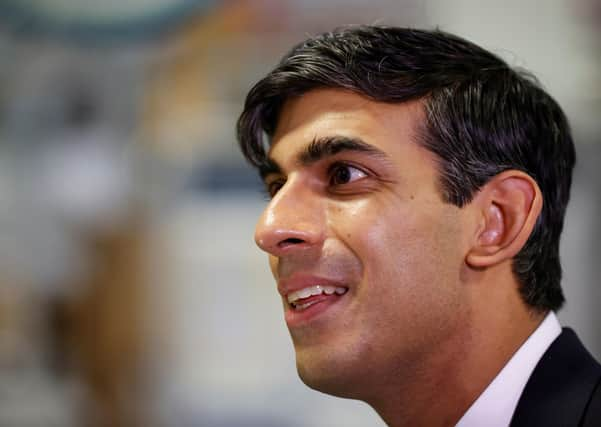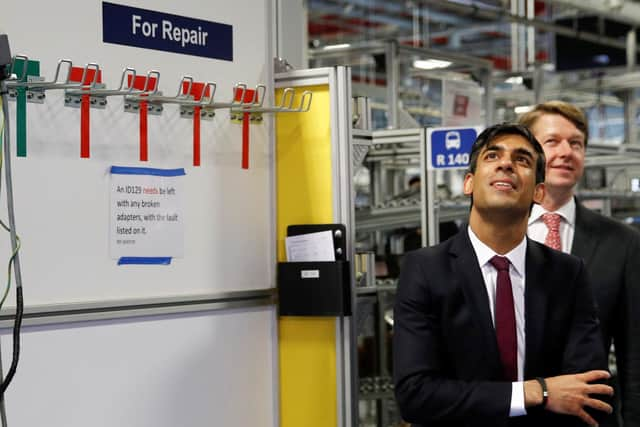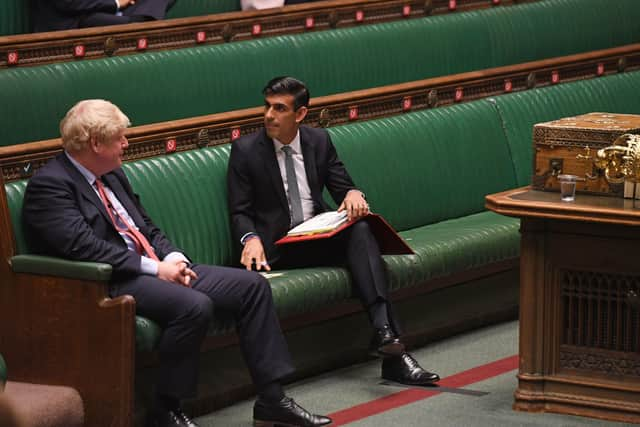Rishi Sunak is emulating Labour’s New Deal – David Blunkett


I listened carefully, therefore, to the Chancellor’s statement on Wednesday and to the much hailed measures which he spelt out. How could I not welcome them? I have over recent weeks advocated many of the measures myself, not least those targeted at the under 25s.
The one I hadn’t spotted was the subsidy from Monday to Wednesday during August for a ‘meal deal’ of 50 per cent off – up to a maximum of £10 per head. Ironically, it will probably most benefit the lunching out of those in retirement.
Advertisement
Hide AdAdvertisement
Hide AdBut the main thrust was the extremely welcome £2bn package for a six-month subsidy for job placements for 18 to 25-year-olds. It mirrors the New Deal for the young unemployed which I put in place with the backing of Gordon Brown back in 1997/8 and the Future Jobs Fund, started after the global meltdown in 2008.


The two lessons learned from previous experiences of this kind were very simple. There has to be training attached, and there must be some prospect of remaining in that employment after the subsidy is over.
Without that commitment, all you achieve is a new cliff edge, coupled with disillusionment and hopelessness. But there were also a couple of other lessons. The first was the need to decentralise the organisation and management of the programme. It should, in other words, be organised locally.
The lesson that should have been learnt from the handling of Covid-19, not least in terms of test and trace but also in getting children back into school, is that you cannot do this from the centre. Creating an enormous national bureaucracy, and then blaming it for failure, is a recipe for disaster.
Advertisement
Hide AdAdvertisement
Hide AdHowever 10 years of the most vicious austerity have reduced the capacity of local authorities to be able to respond. They have in fact been the butt of politically driven ideology which, frankly, saw them as nothing more than a nuisance rather than a vital part of our democratic process.


The second lesson is very simple. You need employers to be on board. Simply appealing to them to keep a member of staff on in November and December, and to offer them £1,000 to do so, won’t do unless you are clearly listening to the sector.
Crucially, and this lesson was learnt in 1997-98, for them to find their way through the myriad announcements, there must be a well-organised campaign to sign up employers of all sizes in both the public and private sector to make the most of the opportunities.
That is what we did over 20 years ago. A hundred thousand employers were signed up in under six months, working with business organisations and the trade unions and ensuring that everyone felt that they were putting the shoulder to the national wheel at the time of an employment crisis.
Advertisement
Hide AdAdvertisement
Hide AdThings are a great deal worse now. Then we were endeavouring to overcome the legacy of the 1980s and 90s in terms of youth unemployment and those who been out of work for over two years.
I also welcome one of the less publicised parts of the package. A billion pounds for the DWP for employing (and of course they have to be recruited) job advisers.
As a former Secretary of State for Work and Pensions, I know very clearly how important it was that job centre staff were both trained – and equipped – to be able to offer individuals and employers personalised and well informed advice, and to help them navigate the maze of options.
In Yorkshire, I hope that we can organise locally and challenge the Government to help fund the programmes put together.
Advertisement
Hide AdAdvertisement
Hide AdFrom local government to large regional employers, the challenge I think must be down to us. Waiting will only result in those losing their job when furlough ends, finding themselves competing on the job market with young people who have never yet had a job.
One final thought.
The Education Secretary, Gavin Williamson, in his speech on Thursday, at last recognised the critical role for Further Education. Time also for Government to put the prejudice against universities behind them.
Encouraging young people who can go into Higher Education to do so ensures that they don’t then displace the youngsters for whom further education and vocational opportunities are absolutely vital.
In simple terms, if the already reasonably well educated take the jobs and opportunities of those with only the first foothold on the ladder of learning, then the most vulnerable, the least educated and the most likely to be unemployed, will find themselves at the end of the queue.
Advertisement
Hide AdAdvertisement
Hide AdIf our economy is to prosper again, it has to do so at every possible level of employment. From well-trained and respected jobs in social care, to construction and tackling climate change, through to the digital economy and innovations in artificial intelligence. ‘Think global, act local’ has to be the mantra for the years ahead.
David Blunkett is a Labour peer and a former Home Secretary.
Editor’s note: first and foremost - and rarely have I written down these words with more sincerity - I hope this finds you well.
Almost certainly you are here because you value the quality and the integrity of the journalism produced by The Yorkshire Post’s journalists - almost all of which live alongside you in Yorkshire, spending the wages they earn with Yorkshire businesses - who last year took this title to the industry watchdog’s Most Trusted Newspaper in Britain accolade.
Advertisement
Hide AdAdvertisement
Hide AdAnd that is why I must make an urgent request of you: as advertising revenue declines, your support becomes evermore crucial to the maintenance of the journalistic standards expected of The Yorkshire Post. If you can, safely, please buy a paper or take up a subscription. We want to continue to make you proud of Yorkshire’s National Newspaper but we are going to need your help.
Postal subscription copies can be ordered by calling 0330 4030066 or by emailing [email protected]. Vouchers, to be exchanged at retail sales outlets - our newsagents need you, too - can be subscribed to by contacting subscriptions on 0330 1235950 or by visiting www.localsubsplus.co.uk where you should select The Yorkshire Post from the list of titles available.
If you want to help right now, download our tablet app from the App / Play Stores. Every contribution you make helps to provide this county with the best regional journalism in the country.
Sincerely. Thank you.
James Mitchinson
Editor
Comment Guidelines
National World encourages reader discussion on our stories. User feedback, insights and back-and-forth exchanges add a rich layer of context to reporting. Please review our Community Guidelines before commenting.